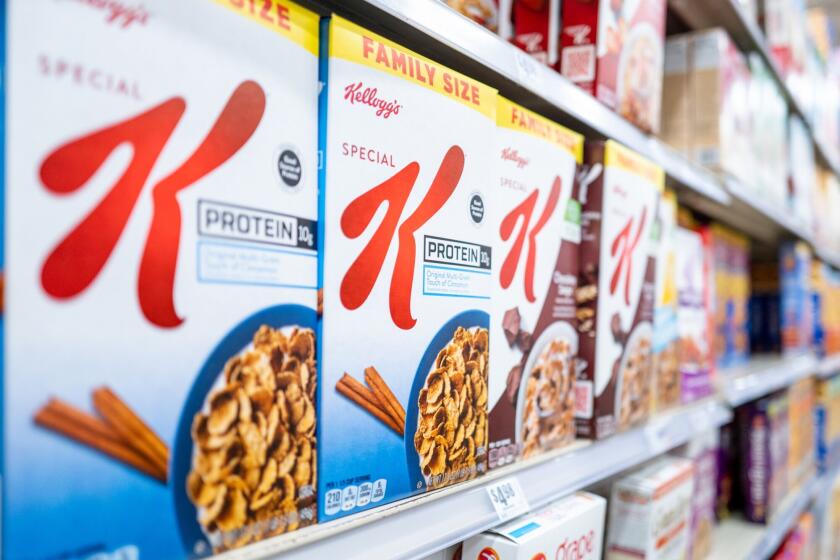Trimedyne’s Rise on Its Laser-Treatment Device Appears to Have Ended
- Share via
Trimedyne Inc. confirmed last week that the rapid earnings growth it enjoyed over the past 2 years had come to a halt. On Wall Street, the Tustin laser catheter maker has been losing ground since the beginning of the year.
Trimedyne reported Friday that earnings for its fiscal 1989 second quarter, which ended March 31, fell 64% to $448,000, while revenue rose 34% to $9.4 million.
Analysts said investors had anticipated that Trimedyne, which in 1987 became the first firm to receive U.S. Food and Drug Administration approval to market a laser catheter to treat arteriosclerosis in the legs, would have difficulty sustaining its growth as competitors entered the market.
Because of that anticipation, Trimedyne’s stock has fallen 43% since January. It closed Friday at $12.50 per share, up 25 cents for the week in over-the-counter trading.
“Trimedyne was a trailblazer, which created a lot of excitement. And now the competition is there,” said Dr. Steven Gerber, a medical technology analyst at Bateman Eichler, Hill Richards, a Los Angeles brokerage.
But analyst David DuClos at Wessels, Arnold & Henderson, a brokerage in Minneapolis, said that Trimedyne is taking the right steps to stay competitive.
He said the company has increased its research and development as well as its marketing staff. The increased spending associated with those commitments contributed to the earnings decline, he added.
“It’s a matter of gearing up,” DuClos said.
In addition, he said that a close look at Trimedyne’s results show the company was still realizing the benefits of prior-year, tax-loss carry-forwards in fiscal 1988, whereas the company now is paying taxes at a 40% rate.
Even though Trimedyne still claims to be the clear leader in the use of laser technology to treat cardiovascular disease, Gerber said that he has doubts about the future of that technology.
He said mechanical treatments now being developed may prove more successful than Trimedyne’s laser system.
DuClos, however, sees no reason to panic. “Long-term prospects are bright,” he said. “I don’t see much downside risk for the stock.”
The stock of Helionetics Inc., a small Irvine defense contractor that emerged from a lengthy bankruptcy reorganization in March, began trading Friday on the Pacific Stock Exchange.
Trading in Helionetics stock was suspended during the company’s 2 1/2-year bankruptcy case. In February, a federal bankruptcy judge approved a reorganization plan proposed by Bernard Katz, a former principal shareholder and director of the firm, and Charles W. Jobbins, a former Helionetics president.
Approval of the Katz-Jobbins proposal followed a bitter reorganization battle that at one time involved four competing plans for resurrecting the company. Katz, his wife and several business associates hold a controlling interest in the reorganized firm.
The company manufactures electronic power-conversion equipment, primarily for military customers.
The stock, which trades under the symbol HLX, sold for $4.25 per share Friday, with 1,000 shares traded at that price.
Helionetics has applied to have its stock listed on National Assn. of Securities Dealers Automated Quotation system, also known as the computerized over-the-counter exchange.
Helionetics enjoyed some heady times in the early 1980s, with its stock rising above $30 per share in 1983. But its fortunes plummeted 2 years later, reflecting an unsuccessful strategy to acquire companies in unrelated businesses. The firm was forced to file for bankruptcy court protection in July, 1986.
Shareholders of Nichols Institute Inc. on Friday approved a stock option plan that will allow the company to grant up to 500,000 shares of stock to employees. Nichols’ board sought the plan because the number of options that the company had been authorized to issue under an existing program had dwindled to 26,000.
Options--which allow their holders to make future purchases at a stated price--often are granted to key managers as an incentive for improved performance.
As of March 31, Nichols had 2.3 million shares of stock outstanding. The stock closed Friday at $17.50 per share, down 25 cents for the week in trading on the American Stock Exchange.
More to Read
Inside the business of entertainment
The Wide Shot brings you news, analysis and insights on everything from streaming wars to production — and what it all means for the future.
You may occasionally receive promotional content from the Los Angeles Times.










